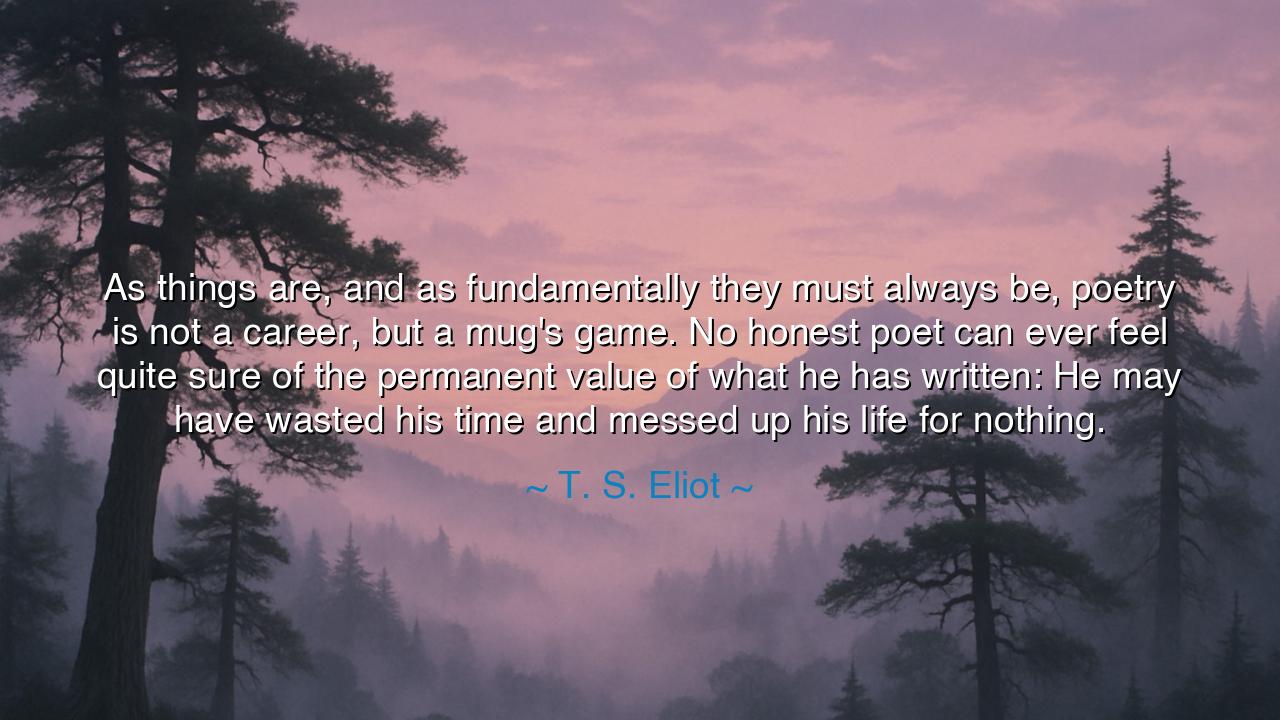
As things are, and as fundamentally they must always be, poetry
As things are, and as fundamentally they must always be, poetry is not a career, but a mug's game. No honest poet can ever feel quite sure of the permanent value of what he has written: He may have wasted his time and messed up his life for nothing.






T. S. Eliot, one of the towering voices of modern verse, once spoke with grave candor: “As things are, and as fundamentally they must always be, poetry is not a career, but a mug's game. No honest poet can ever feel quite sure of the permanent value of what he has written: He may have wasted his time and messed up his life for nothing.” These words cut like a blade, filled with both despair and hard-won wisdom. They remind us that poetry, though exalted by the spirit, offers no guarantee of reward, no certainty of enduring worth. To devote oneself to it is to walk a perilous path, haunted by the shadow of futility.
The origin of this quote comes from Eliot’s own life and the turbulent age in which he wrote. Living through war, disillusionment, and the collapse of old certainties, he was no stranger to doubt. Though his poems reshaped literature and left immortal echoes, Eliot himself was keenly aware of the fragility of art. A poem may live for centuries, or vanish like smoke. The poet, therefore, must face the tormenting truth: that years of sacrifice may yield nothing but obscurity, that the work of a lifetime may dissolve unremembered. Such is the mug’s game, as Eliot called it—a gamble of the soul with no promise of victory.
Yet this confession is not mere bitterness; it is also a mark of honesty. The poet does not create for certainty, nor for fame, nor for wealth. He creates because he must, because silence is intolerable. To be an honest poet is to accept that one’s work may be dust, but still to press forward, to wrestle with words, to pour out the heart into lines that may never be honored. In this way, Eliot reveals a paradox: poetry is both folly and necessity, both wasted time and the essence of life itself.
History gives us countless examples of this truth. Think of Emily Dickinson, who wrote nearly two thousand poems, most unpublished in her lifetime. She lived in obscurity, hidden from the eyes of the world, with no assurance that her words would outlast her. By Eliot’s measure, she may have seemed to waste her life for nothing. Yet after her death, her poems were unearthed, and the world discovered treasures beyond measure. Her life illustrates both the despair and the hope within Eliot’s quote: that the poet can never be sure, yet sometimes the seeds planted in solitude bloom beyond time.
The quote also reminds us of the fragile nature of value itself. Who can say what is permanent? Empires rise and fall, languages change, and what is adored in one age may be forgotten in the next. The poet, more than anyone, lives under this uncertainty. And yet, in that uncertainty lies the beauty of the endeavor. For if permanence were guaranteed, the act of creation would be hollow. It is precisely because the poet writes against the tide of oblivion that the work carries weight. The gamble itself becomes an act of courage.
The lesson for us is this: do not measure the worth of your creative work by its permanence or its recognition. If you seek certainty, you will never create; if you seek only glory, your spirit will falter. Instead, create because it is your calling, your truth, your way of being fully alive. Accept the risk that it may mean nothing to the world, but know that it will always mean something to your own soul. To write, to paint, to sing, to build—these are acts of defiance against the void, and that defiance itself has value, even if forgotten by history.
Practically, let this wisdom guide your life: write your words without fear of obscurity. Offer your art without demand for permanence. Keep faith with the process, not the reward. Like Dickinson, like countless others who sowed their work in silence, trust that your creation fulfills its purpose simply by existing. If the world treasures it, so be it; if it forgets, still you have lived as a maker, not as a mute.
Thus, Eliot’s seemingly grim confession transforms into a call for courage. Poetry is a mug’s game—and yet it is the only game worth playing for those chosen by it. For even if the poet has “messed up his life for nothing,” he has lived in pursuit of the eternal, he has given voice to the unsaid, he has struggled with the sacred fire of language. And that, whether remembered or forgotten, is its own kind of immortality.






AAdministratorAdministrator
Welcome, honored guests. Please leave a comment, we will respond soon